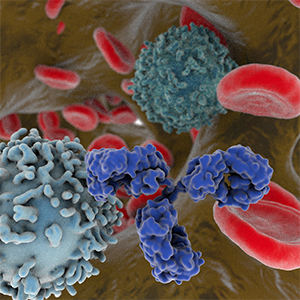 On May 16, 2024, the U.S. Food and Drug Administration (FDA) granted an accelerated approval for IMDELLTRA™ (tarlatamab-dlle) for the treatment of adult patients with extensive-stage small cell lung cancer (ES-SCLC) with disease progression on or after platinum-based chemotherapy. The approval was based on surrogate endpoints, including response rate and duration of response observed in clinical studies, and continued approval for this indication may be contingent upon verification and description of clinical benefit in a confirmatory trial(s).
On May 16, 2024, the U.S. Food and Drug Administration (FDA) granted an accelerated approval for IMDELLTRA™ (tarlatamab-dlle) for the treatment of adult patients with extensive-stage small cell lung cancer (ES-SCLC) with disease progression on or after platinum-based chemotherapy. The approval was based on surrogate endpoints, including response rate and duration of response observed in clinical studies, and continued approval for this indication may be contingent upon verification and description of clinical benefit in a confirmatory trial(s).
IMDELLTRA is bispecific T cell engager (BiTE®, (scFv)2-scFc)) antibody that targets DLL3 on tumor cells and CD3 on the patient’s T cells and has mutations in the Fc (N297G; R292C, V302C) to extend the half-life of the molecules.
FDA’s accelerated approval of IMDELLTRA is based on results from the Phase 2 DeLLphi-301 clinical trial (NCT05060016) that evaluated IMDELLTRA in patients with SCLC who had failed two or more prior lines of treatment, and who had received the 10 mg every two weeks dosing (Q2W) regimen. As reported in the New England Journal of Medicine, results from the study found that IMDELLTRA at the 10 mg Q2W dose demonstrated an objective response rate of 40% and median progression-free survival of 4.9 months. treatment-related adverse events that caused patients discontinuation of tarlatamab treatment occurred in a low percentage (3%) of patients.
IMDELLTRA is currently being evaluated in two Phase 3 studies of SCLC. The Phase 3 DeLLphi-304 study (NCT05740566) is evaluating tarlatamab compared with standard of care in subjects with relapsed SCLC after platinum-based first-line chemotherapy. The Phase 3 DeLLphi-306 study (NCT06117774) is evaluating tarlatamab in subjects with limited-stage SCLC who have not progressed following concurrent chemoradiation therapy. A third Phase 3 study, DeLLphi-305 (NCT06211036), evaluating tarlatamab in combination with durvalumab vs durvalumab alone in subjects with ES-SCLC following platinum, etoposide and durvalumab was not yet recruiting patients as of the last update posted on May 10, 2024.


